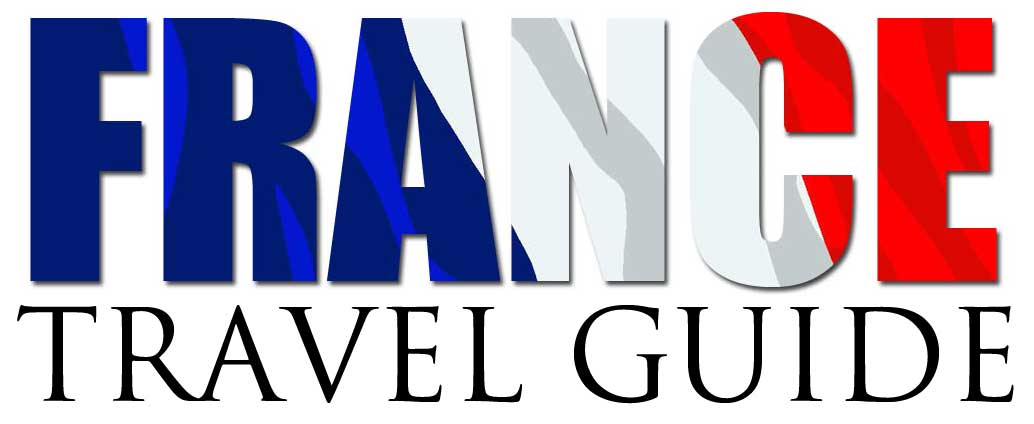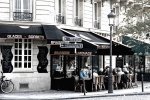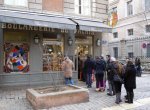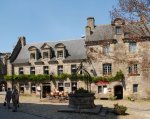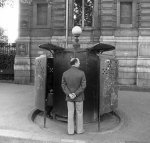why travel to France?
If you're thinking about a European holiday why travel to France? Where do we start? There are so many reasons for visiting this amazing country.
There really is something for everyone in France, something that will delight and enthral each visitor. Whether you come in search of wonderful towns and villages, good food and fine wines, or simply to enjoy a relaxing holiday on golden-sand beaches (with or without your clothes).
culture and heritage
There's so many ways to answer the question - why travel to France? The unique culture and heritage is probably one of the most compelling.
Here you can absorb the culture and outstanding architectural heritage, from amazing chateaux to World Heritage Sites, from beautiful villages where a game of boules is about as energetic as it gets, to the vibrant scenes of Paris, Lyon and Strasbourg...and many more.
For those with energy to burn the winters offer excellent skiing and hard mountain climbs, while the warm breezes of summer are perfect for rambling, cycling, horse riding and the tendencies of those who like to launch themselves into the air attached to little more than an over-sized item of ladies' underclothing...they call it parapente.
With such a large country, the geology is diverse, and that means constantly changing countryside as you pass through, from the agricultural plains of the north to the river- and volcano-fashioned landscapes farther south, and the high mountains – the Alps and the Pyrenees – that frame the country east and south.
So now you know why travel to France. But how do you make the most of your trip? Don't worry we've got your back...
5 tips on getting the most out of your visit to France
1: Paris is not France. Paris is Paris, a capital city in every sense of the word, a unique place, and somewhere everyone should experience…for a while. But if you want to experience the real France, you need to move on.
Sure, make the most of the museums, the fabulous architecture, the luxurious restaurants and hotels; indulge yourself, see the principal sites…but then move on. Three days is plenty.
2: You can’t see France in just a couple of weeks; it’s far too large and diverse a country for that. So, focus. Pick a region, and get to know France region by region. More to the point, choose regions that are neighbours, so you don’t spend too much time just travelling. And, come to think of it, there’s no better way of grouping regions than to use the new, larger regions that came into force on 1 January 2016.
You’ll get so much more for your money if you focus…not only the distinct characteristics of each region, but its cuisine, its wine, its culture. These elements really do differ from region to region. When you think Somme and Picardie, you’re thinking battlefields, war associations, military cemeteries.
When you think Pays de la Loire, you’re thinking wine, chateaux, gardens, architecture. When you think Pyrenees, you’re thinking mountains, adventure, marvellous scenery and the history of the Cathars.
3: If you are fascinated by the French cities, then get to them by rail, and explore on foot or local transport after that. There’s no better way of getting to know Strasbourg (the best Christmas markets in France), Lyon (great museums and restaurants), or Marseille (for that Mediterranean tang).
Let the train take the strain; the TGV service is outstanding, and very fast…and you can book all your tickets before you go by using Voyages-SNCF.
4: Slow down; relax. Don't be in a hurry. You can see and learn a huge amount about France and the French by the simple expedient of taking coffee – or whatever – sitting at one of the street cafés. If necessary, have two coffees, and just watch the world go by. If you find someone playing boules, stop and watch them for a while; they won’t mind.
5: Challenge yourself. Determine in advance to try at least one French delicacy – snails, frog’s legs, foie gras, truffle, riz de veau – or something more calorific, like macarons, Far Bretonne, Iles Flottantes, crème brulée, Madeleines, or alcoholic, like pastis, Pineau des Charentes, marc, calvados, Armagnac…but not all at once! The last three of those are great for settling the stomach after a large meal…a digestif.
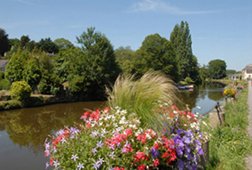 |
why travel to france?
Facts, info, stats
Some things you need to know, others you may never have thought about and some trivia you never realised you needed to know.
geographical information
Traditionally, the country has been divided into 22 administrative regions: Alsace, Aquitaine, Auvergne, Basse-Normandie, Bourgogne, Bretagne, Centre, Champagne-Ardenne, Corse, Franche-Comte, Haute-Normandie, Ile-de-France, Languedoc-Roussillon, Limousin, Lorraine, Midi-Pyrénées, Nord-Pas-de-Calais, Pays de la Loire, Picardie, Poitou-Charente, Provence-Alpes-Cote d'Azur, Rhone-Alpes.
In 2014, however, the French Parliament (the National Assembly and the Senate) passed a law that reduced the number of regions in Metropolitan France from 22 to 13. The new regions took effect on 1 January 2016.
Each region is divided into départements, with a total of 96. There are 38,851 cities, towns and villages, across a land area of 551,695 sq km. The highest point is Mont Blanc (4,810m/15,780 feet), and the coastline is 5,500km (3,438 miles) long.
Mountains
Rivers
- The Loire runs for 1,020km from its source on Mont Gerbier-de-Jonc in Ardèche, at an altitude of 1,408m
- The Seine (776km) rises on the plateau de Langres in Côte d'Or, at an altitude of 471m
- The Garonne (575m, of which 524km are in France) has its source in Spain in the massif de la Maladeta
- The Rhône (812km, of which 522km is in France) rises in the massif du Saint-Gothard in Switzerland
|
Traditional regions |
New regions from 2016 |
general info
Currency
Until 2 January 2002, the currency was the Franc. It has since changed to European currency, and now the Euro is the legal tender. 1 Euro (€) = 100 Euro centimes.
Population
On January 1, 2012 there were 65.35 million people in the country, with more of them living for longer, and more of them being over 65 years old.
Some political stuff
The country is a republic with a written constitution (5th Republic).
The President is Emmanuel Macron (who has a 5-year mandate, from 2017).
The Prime Minister is Edouard Philippe.
Religion
France is a secular republic, although about two-thirds of the population say they are Catholic, and only 2% Protestant. But fewer than 10% of the Catholics are regular church-goers, and the incidence of those admitting to being atheist or agnostic is on the increase.
Education
1. Formal schooling starts at six years in France, although in reality little children are learning from four years old
2. No school uniform in French schools
3. Greater emphasis in France on the core subjects, i.e. French and Maths, and less time given to imaginative/creative subjects (story-writing, drama) in primary school, but paradoxically more time given to learning poems and texts by heart
4. Repeating a year is more common in France, should the child be consistently under-achieving
5. No headmaster or headmistress in French schools – teachers are answerable direct to the regional education authority and a teacher is designated ‘director’ for administrative tasks each year. Secondary schools have a non-teaching, full-time director at the helm
6. No packed lunch in most French schools – it’s either the canteen or home for lunch
7. No celebration of religious festivals, so no nativity play: schools are strictly secular except for the private Catholic schools
8. France still operates what is effectively a primary, middle and upper school system, with pupils entering secondary middle school (collège) aged 11, before going to sixth-form college or high school (lycée) at 15 years old
9. Parents must take out annual insurance – called assurance scolaire – for their children attending school in France, but on the upside, parents receive an annual allowance per child for the ‘rentrée’ to help pay for school essentials
10. Private education is far less prevalent in France – Catholic schools are deemed ‘private’, but teachers are paid by the state as in secular schools, and fees are around €100 per term. there is also a relatively small network of high fee-paying private schools
Why travel to France?
Some French trivia
Beaujolais Nouveau cannot be sold before one minute past
midnight on the third Thursday of November. The uncorking of the first bottles
is traditionally marked with torchlit parades and fireworks.
Time has not been legal in France for decades, even though the Paris-based International Bureau of Weights and Measures (BIPM) is keeping time legal for everyone else. Ironically, France uses as many as twelve different time zones.
One punishment for an adulterous wife in medieval France was to make her chase a chicken through town naked.
Though traditionally there are around 300 to 400 varieties of French cheese, there are in fact over 1,000 different types available in the French market.
The concept of denim clothing was born in the Languedoc-Roussillon city of Nimes – de Nîmes; get it?
France’s official name is the French Republic (République Française). It became a republic in 1792, after centuries of royal rule, as a result of the French Revolution. The Revolution started with the storming of the Bastille fortress on 14th July 1789, an event that is celebrated every year all over France on Bastille Day.
The legal system in France is still largely influenced by Napoleon. French law is still based on the principles set down in Napoleon Bonaparte’s Code Civil in the 1800s.
Paris was originally a Roman city called Lutetia.
In France you can marry a dead person. During World War I, a few women were married by use of proxy to soldiers that had died weeks earlier. This practice came to be called posthumous marriage. Posthumous marriage for civilians originated in the 1950s, when a dam broke and killed 400 people in Fréjus, France, including a man named André Capra, who was engaged to Iréne Jodart. Jodart pleaded with French President Charles De Gaulle to let her go along with her marriage plans even though her fiancé had died. She had support from the media and within months was allowed to marry her fiancé.
At the Petite Syrah in Nice, France, it pays to display
proper gentility –not saying 'Hello', and 'Please' makes your coffee more
expensive.
Potatoes were illegal in France between 1748 and 1772.
Trees in Paris are counted and recorded by the council – there are 478,000!
It is illegal to kiss on or at the train stations in France. This law prohibiting kissing at the train station was put in place by the Société du Chemin de fer to avoid delays? It was thought that people kissing at train stations would be so distracted that they might totally miss the huge, loud trains…some kiss that would be!
Between the hours of 8am and 8pm, 70% of music played on French radio stations MUST be by French artists. Ever wondered why you hear the same music over and over through the day. They do it because it is the law. This law was made to preserve French musical culture and the French language. The French language police claim that the younger generation tends to listen to too much American and British culture.
In 1925, the con artist Victor Lustig created a fake ad stating that the Eiffel Tower was up for sale. This ad was sent around to Parisian scrap metal merchants, who he invited to a meeting in a prestigious Paris hotel. One of the merchants signed a huge cheque for the 7,000 tons of metal. He even paid a bribe for the exclusive rights… before learning that the Eiffel Tower had in fact never been put up for sale by its rightful owner, the Paris city council.
Why travel to France?
Related articles
Recent Articles
-
French Food and Drink - No BS Guide for lovers of Food, Wine, Liqueurs
Aug 28, 19 03:18 AM
Our guide to French food and drink for those who love traditional French food along with our no BS guide to understanding French wine and liqueurs
-
Things To Do In Carcassonne The Ultimate Tourist Guide
Aug 24, 19 06:26 PM
The ultimate tourist guide to things to do in Carcassonne when you visit this wonderful town in Aude France. Discover the places to go and see in Carcassone.
-
Lyon Old Town Guide to Vieux Lyon
Aug 18, 19 07:48 AM
Your complete guide to Lyon old town otherwise known as the Vieux Lyon. Don't miss this amazing part of the city if you're visiting Lyon in France.
-
18 French Villages You Must Visit Most Beautiful Villages in France
Aug 17, 19 06:31 AM
Our guide to the 18 most beautiful French villages you simply must visit. Loads of info, photos and facts in our ultimate villages in France tourist guide
-
What a Pissoir - The True Story of France's Unique Urinals
Aug 13, 19 03:47 PM
Is there anything more French than a pissoir? Sadly on the decline nevertheless the pissor is an endring image of the country. This is their story
